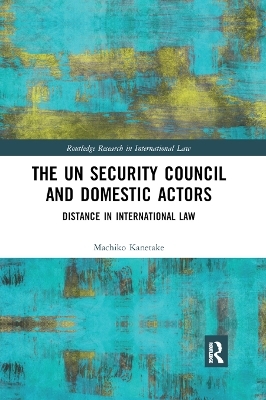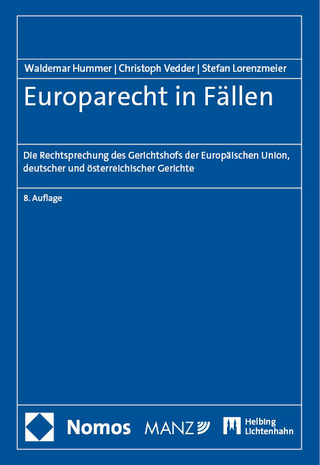
The UN Security Council and Domestic Actors
Distance in international law
Seiten
2019
Routledge (Verlag)
978-0-367-87246-5 (ISBN)
Routledge (Verlag)
978-0-367-87246-5 (ISBN)
This book analyses the regulatory development for the UN Security Council’s exercise of authority with an original perspective of ‘proximity’-- a concept that refers to the ‘distance’ between the UN Security Council’s authority to maintain ‘international’ peace and security.
This book analyses the exercise of authority by the UN Security Council and its subsidiary organs over individuals. The UN Security Council was created in 1945 as an outcome of World War II under the predominant assumption that it exercises its authority against states. Under this assumption, the UN Security Council and those individuals were ‘distanced’ by the presence of member states that intermediate between the Security Council’s international commands and those individuals that are subject to member states’ domestic law. However, in practice, the UN Security Council’s exercise of authority has incrementally removed the presence of state intermediaries and reduced the Security Council’s distance to individuals.
This book demonstrates that this phenomenon has increased the relevance of domestic law in developing the international normative frameworks governing the UN Security Council and its subsidiary organs in safeguarding the rights, obligations, and interests of those affected individuals. This book presents how the UN Security Council’s exercise of authority has been received at the domestic level, and what would be the international implications of the Security Council’s extensive encounter with the actors who primarily reside in a domestic legal order.
This book analyses the exercise of authority by the UN Security Council and its subsidiary organs over individuals. The UN Security Council was created in 1945 as an outcome of World War II under the predominant assumption that it exercises its authority against states. Under this assumption, the UN Security Council and those individuals were ‘distanced’ by the presence of member states that intermediate between the Security Council’s international commands and those individuals that are subject to member states’ domestic law. However, in practice, the UN Security Council’s exercise of authority has incrementally removed the presence of state intermediaries and reduced the Security Council’s distance to individuals.
This book demonstrates that this phenomenon has increased the relevance of domestic law in developing the international normative frameworks governing the UN Security Council and its subsidiary organs in safeguarding the rights, obligations, and interests of those affected individuals. This book presents how the UN Security Council’s exercise of authority has been received at the domestic level, and what would be the international implications of the Security Council’s extensive encounter with the actors who primarily reside in a domestic legal order.
Machiko Kanetake is Assistant Professor of Public International Law at Utrecht University.
List of cases
Security Council Resolutions
List of abbreviations
Preface
1 Introduction
2 The League of Nations and domestic actors
3 Conceptual distance
4 Distance in the Security Council’s Chapter VII measures
5 Reception in international law: a general framework
6 Reception in international law: specific Chapter VII measures
7 Reception in domestic law
8 International implications of the Security Council’s encounter with domestic actors
9 Conclusion
Annex I: National, EU and international cases regarding UN targeted sanctions
Annex II: The procedural development of the 1267 Sanctions Committee
Bibliography
Index
| Erscheinungsdatum | 16.12.2019 |
|---|---|
| Reihe/Serie | Routledge Research in International Law |
| Verlagsort | London |
| Sprache | englisch |
| Maße | 156 x 234 mm |
| Gewicht | 453 g |
| Themenwelt | Recht / Steuern ► Allgemeines / Lexika |
| Recht / Steuern ► EU / Internationales Recht | |
| Recht / Steuern ► Öffentliches Recht ► Völkerrecht | |
| Sozialwissenschaften ► Politik / Verwaltung ► Europäische / Internationale Politik | |
| ISBN-10 | 0-367-87246-3 / 0367872463 |
| ISBN-13 | 978-0-367-87246-5 / 9780367872465 |
| Zustand | Neuware |
| Informationen gemäß Produktsicherheitsverordnung (GPSR) | |
| Haben Sie eine Frage zum Produkt? |
Mehr entdecken
aus dem Bereich
aus dem Bereich
Die Rechtsprechung des Gerichtshofs der Europäischen Union, deutscher …
Buch | Softcover (2025)
Nomos (Verlag)
CHF 52,50


